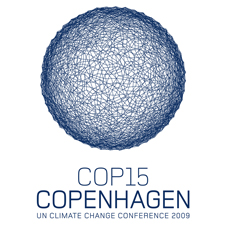
Copenhagen climate conference kicks off
Dec 7 , 2009 - David Biello - Scientific American
 |
To be or not to be? That is the question. Will 192 world governments agree in the next two weeks on a framework to cut emissions of greenhouse gases and thereby combat climate change? Or will they dither and divide at the Copenhagen climate summit, as they did with previous efforts, including the ineffectual Kyoto Protocol?
The science is clear. Whatever one may make of the recent stolen emails from the University of East Anglia's Climatic Research Unit, the world is still warming (up 0.7 degrees Celsius over the course of the 20th century), its ice is still melting away (sea ice is down to as little as 1.59 million square miles at the North Pole), and even spring has sprung forward. Most importantly, there is no credible alternative hypothesis to the simple physical explanation for this climate change offered by most scientists: infrared radiation trapped by carbon dioxide and other greenhouse molecules in the atmosphere. Not variations in the sun's strength, not the urban heat island effect, not even cosmic rays.
"The costs of responding to climate change will become progressively higher as time goes on, therefore we must take action now," said Rajendra Pachauri, chair of the Intergovernmental Panel on Climate Change and co-recipient of the 2007 Nobel Peace Prize, at the opening gathering Monday.
I'll be headed to Copenhagen from December 10 through December 19 to join the 15,000 participants, and while there I'll be observing how negotiators factor in the science as they deal in the "art of the possible," as politics has been described. Initial signs are more hopeful than you might think: the U.S. has a (weak) proposal on the table and President Obama will lend his weight to the final day of the proceedings along with 109 other world leaders; the world's leading emitter—China—has agreed to reduce its emissions intensity by at least 40 percent (and some government officials have even talked of an emissions peak by 2040); and the world is focused on preventing the deforestation and destruction that makes Indonesia and Brazil (which has pledged its own cuts) leading emitters and may offer up the hard cash to allow a different development path.
"Never in 17 years of climate negotiations have so many different nations made so many firm pledges together," said Yvo de Boer, executive secretary of the United Nations Framework Convention on Climate Change. "Industrialized countries meeting under the Kyoto Protocol need to raise the level of ambition of developed countries with regard to individual targets," specifically he'd like to see them parcel out among themselves global reductions of at least 25 percent below 1990 levels by 2020. That said, the gap between what countries have proposed and what is needed is just 2 billion metric tons, according to a new analysis by economist Nicholas Stern of the London School of Economics and the UN Environment Programme.
There are plenty of things each of us can do on an individual level, whether it's buying a more fuel-efficient car or bulking up the insulation in our home. Put that all together in just the U.S.: Americans could cut emissions by 7 percent—as much as all the pollution spewed by aluminum smelters, petroleum refineries and iron and steel works combined. Combine that with some other "wedges" such as more electricity from renewables or electric cars and suddenly the U.S. begins to approach the 80 percent cut necessary by mid-century to avoid catastrophic climate change.
The only thing stopping us is indecision, and we certainly don't want to end up like Hamlet. By the end of the conference, said Danish Prime Minister Lars Loekke Rasmussen, "we must be able to deliver back to the world what was granted us here today: hope for a better future."
Read More About: greenhouse gas emissions, copenhagen conference, climate change, cap and trade, emissions cuts, co2, global warming, ipcc, copenhagen

|



